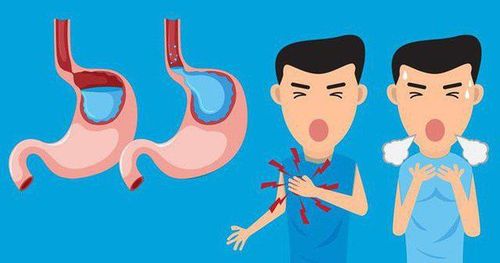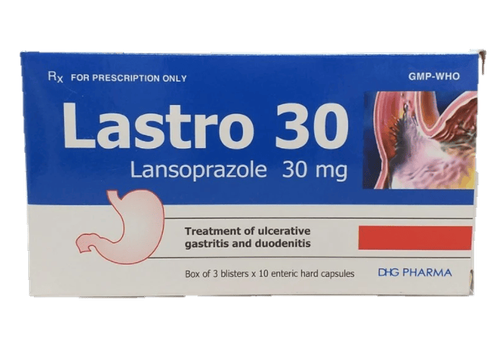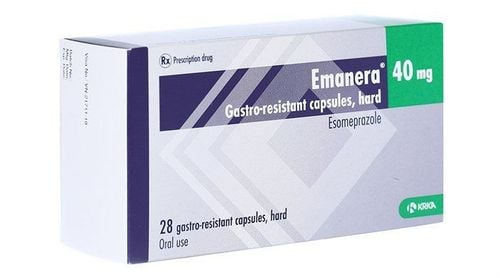This is an automatically translated article.
The article is professionally consulted by Master, Doctor Dang Xuan Cuong - Emergency Resuscitation Department - Vinmec Hai Phong International General Hospital. The doctor has 14 years of experience in the field of emergency resuscitation and poison control.Gastroesophageal reflux is a condition that occurs when acid from the stomach moves up into the esophagus, causing irritation of the local lining, leading to symptoms of heartburn, a burning sensation in the chest, and especially a persistent cough. long term, reducing the patient's quality of life.
1. What is gastroesophageal reflux disease?
Gastroesophageal reflux disease, or GERD, is a digestive disorder that originates from the lower esophageal sphincter, a ring of muscle located at the midline border. esophagus and stomach. In normal upper gastrointestinal motility, the lower esophageal sphincter opens to allow food from the esophagus to enter the stomach and closes to prevent food and acidic gastric juices from moving. back up into the esophagus.Gastroesophageal reflux will occur when this muscle ring weakens or encounters inappropriate relaxation conditions, facilitating gastric juice to flow into the esophagus. Since then, the patient presents with symptoms, both gastrointestinal and oral cavity, throat and respiratory tract, such as a burning sensation in the chest or heartburn, heartburn, usually after eating, which is worse in the morning. night; chest pain, difficulty swallowing, severe cough, laryngitis, new or worsening asthma and sleep disturbances.
Many people, including pregnant women and children, experience heartburn or acid indigestion caused by GERD. However, the problem of treatment can be both simple and complex. In most cases, GERD can be relieved through diet and lifestyle changes; though, some people may need prolonged medication or even surgery.
Trắc nghiệm: Làm thế nào để bảo vệ lá gan khỏe mạnh?
Làm test trắc nghiệm kiểm tra hiểu biết về gan có thể giúp bạn nhận thức rõ vai trò quan trọng của gan, từ đó có các biện pháp bảo vệ gan để phòng ngừa bệnh tật.2. Why does gastroesophageal reflux cause a lot of cough?
A chronic cough is usually defined as a cough that lasts for 8 weeks or longer. Of the causes of chronic cough, the possibility of gastric acid reflux into the esophagus should be suspected in the setting of GERD.Although a chronic cough is not a typical symptom of GERD, GERD is responsible for at least 25% of the origins of chronic coughs. According to some studies, this percentage can be as high as 40%. It has also been hypothesized that a chronic cough could not only be caused by acid reflux, but also make acid reflux worse. There are two possible mechanisms to explain this problem. First, coughing is thought to be a reflex action when there is an increase in acid from the stomach into the esophagus, in order to protect the airways. The second mechanism is that refluxed fluid moves up and out of the esophagus, small drops of stomach acid falling into the throat, causing coughing. This type of reflux is called laryngeal reflux. Not only that, when stomach acid comes into contact with the vocal cords and throat, GERD can cause inflammation that can lead to symptoms like hoarseness, a feeling that something is stuck in the throat, or pharyngitis and tonsillitis. long.
In general, it is important to acknowledge the link that exists between chronic cough and GERD. A persistent cough is always a common problem and a person can have two conditions at the same time, one is GERD, the other is another condition such as asthma, respiratory infection, bronchitis, medication use Leaves or use antihypertensive drugs of the ACE inhibitor class.

Biến chứng của bệnh trào ngược dạ dày thực quản có thể dẫn đến ung thư
>> See more: Prolonged cough - Beware of causes due to gastroesophageal reflux - Posted by Master, Doctor Mai Vien Phuong - Department of Examination & Internal Medicine - Vinmec Central Park International General Hospital
3. How to diagnose the relationship between gastroesophageal reflux and cough?
To diagnose GERD and chronic cough as related, doctors will take a detailed medical history and evaluate each individual's symptoms. It can be more difficult to diagnose a chronic cough in people who don't have accompanying heartburn.Besides, the best way to diagnose GERD is to monitor the pH in the lumen of the esophagus continuously for 24 hours. This test is done by placing a probe through the nose into the esophagus. The patient still eats and drinks as usual, including walking, lying down. When there is acid reflux into the esophagus, the sensor will record the frequency. Because it is a relatively complex, hospital-based procedure, this test is used less often than clinical diagnoses, which are based solely on symptoms and case-by-case history.
In addition, the diagnosis of GERD is based on experience when patients are experimentally treated with proton pump inhibitors (PPIs), which are one of the medications used to treat GERD. If the cough symptoms improve at the same time, this can help determine that the cough is related to the reflux problem.

Để chẩn đoán GERD và ho mạn tính bác sĩ sẽ khai thác tiền sử bệnh lý thật chi tiết
4. Prevent a lot of cough due to gastroesophageal reflux
Certain lifestyle changes such as wearing loose-fitting clothes, eating slowly, and quitting smoking can help people with chronic cough caused by acid reflux to improve this discomfort very effectively, especially for those with symptoms. mild to moderate symptoms. Accordingly, people with a chronic cough caused by acid reflux can try the following lifestyle changes to improve their symptoms:Maintain a healthy body mass index (BMI): This can relieve a certain amount of pressure on the stomach, reducing the amount of stomach acid forcing on the esophagus Wear loose clothing: This also indirectly reduces pressure on the stomach Stop smoking: Smokers can higher risk of GERD Eat slowly and avoid overeating: Large meals inhibit the closure of the lower esophageal sphincter, allowing stomach acid to rise into the esophagus Do not lie down immediately after or during a meal : People should wait about 3 hours after a meal for gastric juices to be digested before lying down. Elevate the head of the bed: People with GERD at night can try elevating the head of the bed to reduce the amount of acid entering the esophagus. Dietary changes: Certain foods and beverages that trigger acid reflux should be limited, such as alcohol, caffeine, chocolate, citrus, and foods rich in flavors such as sour, spicy, mint, garlic, and onions. , fried foods or high-fat foods. In short, a profuse cough is sometimes a silent symptom of GERD. If not thought of for treatment, chronic cough can greatly affect daily activities. Therefore, when a cough lasts for a long time, it is necessary to visit a doctor, find the cause and treat it properly, avoiding long-term sometimes leading to complications that are difficult to control.
Please dial HOTLINE for more information or register for an appointment HERE. Download MyVinmec app to make appointments faster and to manage your bookings easily.













